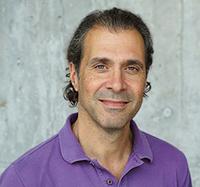Optimization of Stochastic Epidemiological Models for Disease Control and Prediction
Khalil Al Handawi – McGill University, Canada

Infectious disease modeling relies on describing the complex human social interactions that govern its spread. Epidemiological models must make assumptions about social interactions that occur between individuals resulting in uncertainty in the predicted pandemic trajectories. Policy makers must rely on the forecasts of these models to guide their decision-making and interfere as necessary to keep the disease in the endemic phase. Decision-making involving such models can be challenging due to the uncertainty involved. We present an epidemiological agent-based model that describes the uncertainty in human social networks by means of agents whose behaviour is governed by probabilistic models. We show a first application of the stochastic mesh adaptive direct search (StoMADS) algorithm for derivative-free optimization of noisy black-boxes such as agent-based models and use it to guide decision-making for optimal public health policies that balance socio-economic impact with infection incidence. We also present a second potential application of the StoMADS algorithm for tuning the hyperparameters of heuristic machine learning algorithms used for COVID-19 incidence prediction and forecasting. These applications of stochastic derivative-free optimization involved computationally expensive noisy black-boxes that require ample computational resources and parallel computing to execute and can set a precedent for the use and development of such algorithms in managing problems involving similar black-boxes.
Biography: Khalil Al Handawi (He/Him/Il) received his PhD in mechanical engineering from McGill University, Canada. His dissertation focused on the optimization of aerospace design for flexibility and robustness against environmental and operational changes. His research into engineering design resulted in decision-support tools for accommodating change in design requirements during product development. The tools help designers imbue products with the necessary flexibility that enables remanufacturing in the future and/or the necessary robustness to absorb change in the form of design margins. He participated in a technology transfer at GKN Aerospace Engine Systems, Trollhättan, Sweden to help integrate his research into industrial workflows.
He received his bachelors and master’s degrees in mechanical engineering from Khalifa University, United Arab Emirates with an emphasis on asset integrity management of civil structures used in the energy industry such as Oil and Gas pipelines. He designed and prototyped intrinsically safe photonic sensors to monitor structural health of oil pipelines based on mechanical transduction mechanisms.
Khalil Al Handawi is currently a postdoctoral researcher at McGill University at the Systems Optimization Lab (SOL) and a visiting researcher at Chalmers university of technology, Sweden, where he is working in collaboration with researchers from the Systems Engineering Design (SED) lab on developing a design margins library for identifying and localizing design margins in complex engineering systems and assessing their value in different conceptual designs. Khalil also used state-of-the-art stochastic derivative-free optimization algorithms developed by the Group for Research in Decision Analysis (GERAD) to solve public health policy-making problems under uncertainty and tune the hyperparameters of various machine learning models used for now-casting the COVID-19 pandemic.
He is an ASME and design society member and is the recipient of the McGill Engineering Doctoral Award, the Fonds de recherche du Québec Nature et Technologies (FRQNT) doctoral fellowship and the Natural Sciences and Engineering Research Council of Canada (NSERC) postdoctoral fellowship.


Location
Montréal Québec
Canada